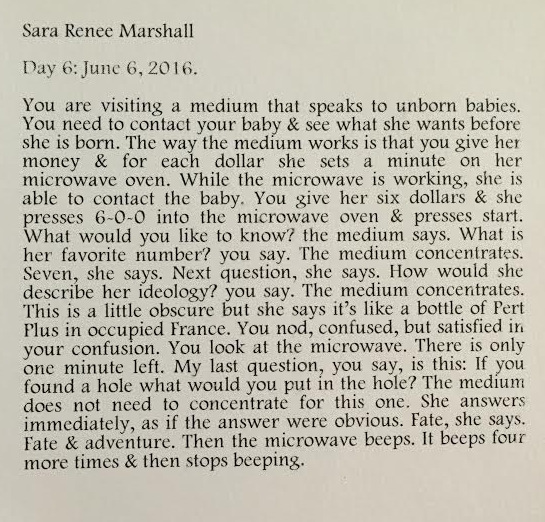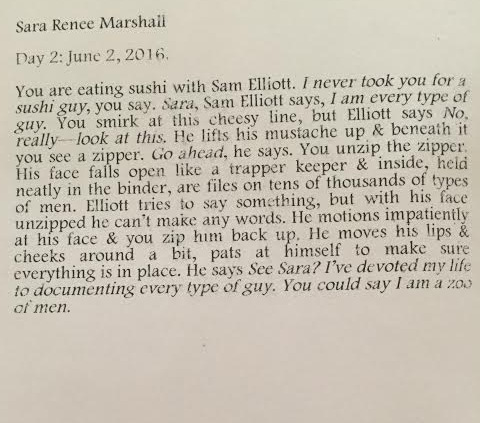Interviews
Dream Delivery Service: An Interview with Mathias Svalina

About the Dream Delivery Service
In 2014 I started a Dream Delivery Service. I take about forty subscribers a month then write & deliver dream poems to them every day. I write the dreams from my imagination. Every day I try to write a unique dream for each subscriber, though I often fall short. For subscribers within a four-mile radius of my home base I deliver the dreams to their doors, biking through the empty city before dawn. For subscribers outside the radius I mail the dreams every day. During the months I deliver dreams I write a lot, bike a lot, & get pretty weird.
In 2015 & 2016 the Dream Delivery Service was based in Denver. Starting in September of 2016 I'll be travelling around the country delivering dreams for a month at a time in various cities: Richmond, Tucson, Marfa, New Orleans, Chicago, & maybe more.
Sara Renee Marshall, amazing poet & thinker & human (& also a Dream Delivery Service subscriber), agreed to ask me a few questions about the service. Thanks so much to her!
Visit the Dream Delivery Service for more information or to subscribe.
—Mathias Svalina
* * *
Sara Renee Marshall: I am an ongoing Dream Delivery Service subscriber. I'm thankful for my dreams, which feel like my dreams—a second round of misfit narratives I get to turn over in my head each day, enchanted by their images and jokes and absurdity. This round, I have been thinking about the roles of undoing and futility in the surreal poem or dream: generating, for instance, the right questions about one's future child for a medium, while the duration of her clairvoyance is determined by a microwave. There's something frighteningly profound and apropos about the impossibility of those questions, about that absurd dissipation of time. Can you say something about generating narrative frameworks that are likely to come apart?

Mathias Svalina: One thing I love about dream logic is that nothing comes apart, or if it does the coming-apart is also a binding. Any thing can intrude in a dream & it's just like Well, yeah, of course, whereas intrusions in reality-logic are difficult & cause rupture & require processing & understanding. In the dream every new thing emits tendrils of meaning & sympathy to help the whole cohere. The stumble becomes the first step to flight, the stupid a means of profundity, the natural estranging. It is the instantly re-self-making rhizome of meaning, a hermeneutical swarm, a scenic shitshow of potential. (Nightmares, anxiety dreams, they have different goals, but the logic of them is maybe still the same.) So as I'm writing dreams I think I am looking for the thing to happen that would require a reseaming & reseeming in reality but which instead only adds a mystery-layer of potential meaning to the dream.
SRM: When you're immersed in a dream delivering month, do you write notes toward dreams between writing spurts?
MS: I'm pretty much keeping notes all day long when I'm doing dream-work. Some of them are interesting images or quirky turns that I might include in the narrative structures but often they are just stuff. The more stuff I can gather from the world the more I can get away from the limitations of merely my stuff. It has made me rethink the imaginative space of the object, how any thing can be invested in, can be made symbolic or personal or tragic or joyful given one's angle of approach. So as I go through the parts of the day in which I'm not writing I try to stay open to letting other people's stuff be meaningful, both the ostensibly profound & the ostensibly debris.
SRM: I like the sound of that intimate porosity—the way the other and their significances can leak in, even take the semiotic lead. It's not exactly profound, but a light bulb just lit up for me about fiction writing: perhaps this is one approach to writing fiction de-centered from or less tethered to one's own limited orbit. Has writing dreams, or even the daily embodied engagement with others you're describing, affected your fiction writing?
MS: I'm still very much in the infancy of my thinking about how fiction works, but one thing that seems important to me is the sense of authorial control & how that merges with the reader's access to a piece of fiction. There are some writers I love because they say the exact thing they want the reader to think & there is a kind of mind control at work & there are others who suggest more than they control & allow the aesthetic event to happen in the reader's experience (& obviously a wide spectrum between these). If writing dreams has taught me anything about fiction's functions it's in how the space of suggestion allows for something alchemical to happen. If it has not taught me something it is how to do that controlled precision kind of writing.
SRM: Some dreams are characteristically hilarious (I am thinking of a dream in which Sam Elliott proved to me over sushi that he was a veritable "zoo of men," though this suddenly feels poignant too). Other dreams seem to bounce off the real, the beautiful, the devastating, or lonely. Do you knowingly alternate between different moods, or do you wind up somewhere you didn't know you were going?

MS: Every dream pretty much begins with "You are at [insert odd location]." And then something happens. And for me that's the moment when it all begins. Narrative in realist writing needs to make a working structure. But in dream-writing narrative can be cluttered or moebius or amoebic or marital or really anything—you can madlibs in any adjective here & narrative can function that way in a dream. Dreams propel. It's a relief as a writer &, I hope, as a reader to allow oneself to be propelled without a need for a functional telos or satisfying ending. So yeah, I think I end up focusing more on tones & moods: I think my fallback tones are either unspeakable-wonder or unspeakable-confusion. They seem to me what I want out of exploring dream logic, the awe & terror & love that does not benefit from rational understanding, that is even undermined by understanding. As for whether I knowingly shift moods between dreams for any one subscriber, no, I'm usually way too tired & frantic to have any recollection of the last dream I just wrote, much less ones I wrote the day before.
Actually, maybe unspeakable-wonder & unspeakable-confusion are the things I focus on most in reality-life as well.
SRM: Some of your subscribers are people you know, while some are strangers. What is the difference in your writerly relationship to these different readers? Do you find you like writing for some audiences more than others?
MS: In writing for people I know I sometimes employ personal details, but I try to make them open still. I don't want to come off as a half-assed mystic, attempting advice through the vague vagrancy of the aesthetic. I think I want to create a flat thing for a reader to make dimensional my stepping into it. Like the magic door a child might attempt to draw onto a wall.
For subscribers I don't know: I try to keep things fraught but indefinite, gendered-neutral, but relatable. I reference family members everyone has, even if they don't have a relationship with them, experiences that anyone has had at least some times, but then I also reference things that I know they might not have any interest in, might not even know about. And don't those things appear in dreams too? Maybe the aesthetic is a bit of the half-assed mystic, the cold-read techniques of the street-level palm-reader. And I guess that's cool. It's also part of what I love in Kafka or Galeano, that sense of anyone potentially being in that fabulist space, anyone/everyone all at the same time.
Mostly, I like writing something intentionally aimed at a single person & picturing them opening the pink envelope & reading it. But there's also something mysterious & scary about sending some peculiar affront out to a stranger. Writing nightmares for strangers is perhaps the least fun. I just feel bad sending people who are being nice to me all this bummer stuff every day.
SRM: Maybe some subscribers feel better in the bummer darkness? I imagine your writing spells have to be concentrated and intense—the month itself like a series of tunnels to travel. What helps you to keep your mind alive and firing for these spells?
MS: I consistently get less than five hours of sleep a day when I'm doing these dream-work months, & often much less, which creates its own kinds of spooky energy. But that could go south real quick if it weren't for the support of my friends. The first year I did this I got pretty hermitty & weird & that was interesting but ultimately not what I wanted. So this year I've committed to seeing friends every day for at least some point of time & having that space to playact at being normal is great help in keeping my head from folding into a swan. Beyond that I seek out a constant influx of art books & websites, I return to a lot of the poetry that I love most, I try to read a few pages a day from some novels or theory books I'm interested in. I think the key to keeping firing is to not be stuck inside of what seems easy or natural to go to in strangeness, to write what I'd like to not know.
Also, Feeling Better in the Bummer Dark is now the title of my new self-help book.
SRM: Which texts do you return to, or what are you reading now?
MS: The books I constantly return to when writing dreams are also the stuff I just normally love: Dickinson, Lucille Clifton, John Donne, Agha Shahid Ali, Khadijah Queen, Paul Celan, Lorca, Larry Levis, Eduardo Galeano, Alice Notley, Marisol Limon Martinez, Wong May, Arthur Sze—poets whose work feels lifebloody to my thoughts.
I was also reading Selah Saterstrom's amazing recent novel Slab, which works in part like a long hallucinatory dream of self-reckoning. Steven Dunn's new novel Potted Meat is blowing my mind, brutal & beautiful & hilarious & heart-breaking & freaky. Aditi Machado has a new chapbook, Route: Marienbad, which is fantastic—all her work as a writer & editor is inspiring. Also was reading & rereading various Keith Ridgway books: I love that guy's ability to turn from simple to searching in the span of a seemingly straightforward clause. I think I kept at least one Kristeva book within arms-reach every day. She is the queen of expansive potentiality in images.
SRM: Do you ever get halfway through an idea and discard it? How do you know you've got the makings of a dream? Or have you come to trust your instincts?
MS: Man alive, I don't think I discarded any of these. I make notes for dreams that I never write, but once I push through writing them I usually keep them. In a sense the individual dreams don't matter; or it's not important that they're "good." One doesn't dream cinematic or profound dreams every night. Sometimes you dream about buying aspirin or waiting in line to cash a check for seven dollars. When writing these I try to take on more of a channeling feel than a writing feel. And that's liberating for me, to not need to create a precious text, just to create within the form & feel it out over & over again. But I guess that also relies on me trusting my skills within the form & with these kinds of formalist marathons—since these kind of repetitive formal surrealist projects (creation myths, businesses plans, children's games instructions, failed love stories, etc) are something I tend to do I feel like my writing process is primed for this. Since I haven't saved the dreams or reread them in the past I don't really have an understanding of what they were like. I only rarely even remember one. Though, I can't get a turtle karaoke dream I wrote the first year out of my head.
SRM: Now in your third season—and suddenly with the larger scope of many dream-writing months ahead—how is your approach different than in the beginning?
MS: I think the biggest change in my approach is to not push myself past when the creative energy runs out. Some days some people dream the same dreams, which is fine. I'd rather feel confident in what I'm writing than frantically trying to fill a form with whatever mental space is available. I also feel more refined in my focus. I feel like the dreams in this third year are better than the previous years. But also, I deleted all the old ones so I have no idea. Maybe I'm just optimistic. Which is weird.
SRM: What excites or daunts you about taking Dream Delivery to new cities?
MS: The daunting things are mostly obvious: the logistics of where I'm going to live, getting attention & subscribers in new cities, money, how bikable the cities are, having a good space in which to write, money, money, etc. But these fears are also exciting to me. One of the pleasures of the project is to watch how it works as I do it. It's constantly kind of hilarious to me.
After a few years of doing Dream Delivery Service, there is a feeling of routine, even if it is a peculiar routine of pushing at the edges of my productivity & creativity. I'm excited about exploring different cities through this routine, creating new creative patterns in new landscapes, making new kinds of connections with old friends & making connections with new people, biking across the desert in winter, getting a chance again to write my heart out like a weirdo. So many things. I'm pretty much a tabletop science-fair volcano of excitement right now.
SRM: I suspect the cities will unfold for you. Wishing you both luck and joy.
MS: Thank you! wishing the same for you & your new adventures!
* * *
Sara Renee Marshall comes from Colorado. Her work has appeared in OmniVerse, Colorado Review, Everyday Genius, jubilat, in chapbooks, and elsewhere. She teaches & tutors at University of Georgia where she is pursuing a PhD. Sara lives and writes in Athens with Thomas, Saint Francis, and Rosa.
Mathias Svalina is the the author of five books, including Destruction Myth (Cleveland State University Poetry Center), Wastoid (Big Lucks Books), and the recently released The Wine-Dark Sea (Sidebrow Books). His poems and short fiction have been widely published and anthologized, including recently in New American Stories (Vintage Contemporaries). He is an editor for the small press Octopus Books. Since 2014 he has run a Dream Delivery Service & beginning in September 2016 he will be delivering dreams in various cities: Richmond, Tucson, Marfa, New Orleans, Chicago, and beyond.




